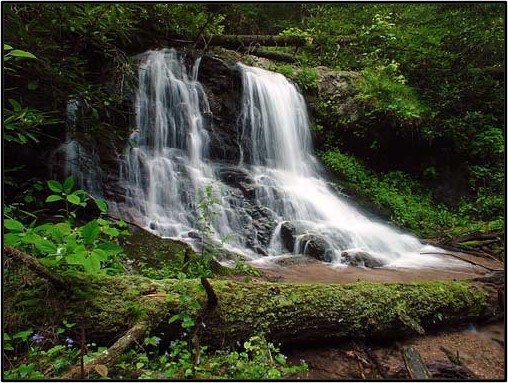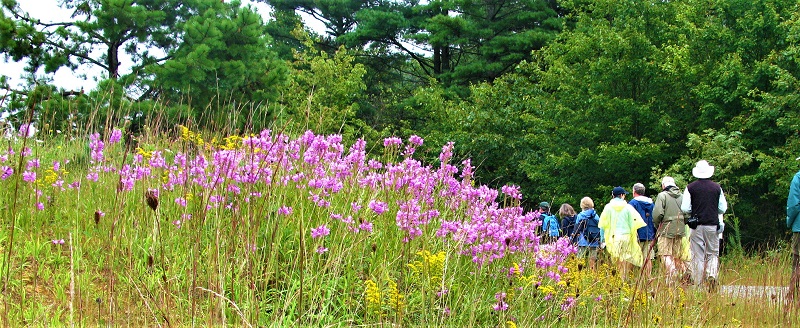Lately, it may seem that the world is reverberating from one global crisis to another. Climate change was our rallying point a year ago. Then came a pandemic. Now, cities across the globe are roiled by protests against racism.
Racism is nothing new. But why the surprise? Did our collective consciousness just need a jolt from people who finally have had enough? And why should we, as environmentalists, feel a new urgency to make sure our work absorbs and includes racial equity?
The Sierra Club and the North Carolina Chapter have been working for some time in centering equity in our work. Our state is, arguably, the birthplace of the environmental justice movement. But even we, as environmentalists, must - and can - do more.
 Hop Hopkins, the Club's Director of Strategic Partnerships, makes an unassailable case for the intersection of environmentalism and social justice in a recent article for Sierra Magazine. And as a black man and an environmental activist, he speaks from firsthand experience.
Hop Hopkins, the Club's Director of Strategic Partnerships, makes an unassailable case for the intersection of environmentalism and social justice in a recent article for Sierra Magazine. And as a black man and an environmental activist, he speaks from firsthand experience.
"You can’t have climate change without sacrifice zones, and you can’t have sacrifice zones without disposable people, and you can't have disposable people without racism," he writes. He also points out that even white people - all people - will suffer if racism isn't addressed: "[I]f climate change and environmental injustice are the result of a society that values some lives and not others, then none of us are safe from pollution until all of us are safe from pollution."
That means, as people who care about the planet, that we can't say "all lives matter" until we show that "black lives matter," through our work every day. And so we will.
What can you do right now to help us deepen our commitment to racial and environmental justice in North Carolina?
First, we ask you to step up and join the N.C Sierra Club today - there's a button at the top of this page to take you to the right form. Members will be invited to help us elect leaders this November who will work to protect people of color - and thereby the rest of us - from pollution, dirty fuels and other environmental threats.
Second, we ask you to take action to support an economically challenged community in Robeson County that is fighting a dirty industry's attempt to locate in its area. Read more about how you can do it below.
Come with us as we work together toward justice for our people and our environment today and in November!
Thank you
Your N.C. Sierra Club staff
Don't miss your last chance to make an impact on these issues!
 Time's getting short for you to speak up on three very important environmental issues affecting North Carolinians across the state!
Time's getting short for you to speak up on three very important environmental issues affecting North Carolinians across the state!
You have until June 26 to urge the state to reject a permit for a wood pellet plant in Lumberton. This plant threatens the environment by encouraging landowners to level forestland,and will expose neighbors to the dangerous, untested process used to turn trees into wood pellet fuel. We also encourage you to sign up for an online hearing on the permit to be held at 6 p.m. Monday, June 22, by the Department of Environmental Quality (DEQ).
The state is also considering a mining permit for a quarry just outside Umstead State Park between Raleigh and Durham. You can still submit a comment to ask DEQ to reject the permit, but now you can also attend a virtual public hearing on the plan at 6 p.m. Tuesday, June 23. Be sure to tune in and listen to local community leaders discuss the consequences of these mining activities on one of the Triangle’s most beloved places!
And you have until June 29 to submit comments on the U.S. Forest Service's draft management plan for the Pisgah and Nantahala national forests. The draft plan is complicated, so we've distilled some important points into a letter you can personalize and either print and mail yourself or submit for us to mail for you.
Welcome our new team members!
We're excited to introduce you to the newest member of the N.C. Sierra Club staff, as well as our team of summer interns, on loan to us courtesy of Duke University's Stanback Fellowship Program.
 Rosa Hodge-Mustafa is the Chapter's new organizer in Charlotte, where she'll be based. Rosa has a long history of environmental, racial and civic activism. She's been an environmental advocate for people living near the Charlotte Douglas International Airport, founding the South West Charlotte Roundtable and Coalition to help residents work together to address their concerns.
Rosa Hodge-Mustafa is the Chapter's new organizer in Charlotte, where she'll be based. Rosa has a long history of environmental, racial and civic activism. She's been an environmental advocate for people living near the Charlotte Douglas International Airport, founding the South West Charlotte Roundtable and Coalition to help residents work together to address their concerns.
Rosa comes to us after more than three years with the League of Conservation Voters, where she partnered with Mecklenburg Parks and Recreation on environmental projects. She currently serves on the Mecklenburg County Air Quality Commission and as environmental chair for the Charlotte-Mecklenburg County NAACP.
In the past, she served as public relations chair for the Mecklenburg County Democratic Women and environmental affairs chair for the Forest Pawtuckett Neighborhood Association. And in the political realm, Rosa was a city council candidate in 2015, worked on Kay Hagan's Senate campaign in 2014 and is currently Mecklenburg County Precinct 80's chair.
 Two of our interns are rising sophomores at Duke. Robby Phillips is studying public policy and has been involved in climate justice organizing for about a year with the Sunrise Movement. This summer, he's working with the chapter's lead organizer, Blake Fleming, to support the Ready for 100 Campaign across North Carolina.
Two of our interns are rising sophomores at Duke. Robby Phillips is studying public policy and has been involved in climate justice organizing for about a year with the Sunrise Movement. This summer, he's working with the chapter's lead organizer, Blake Fleming, to support the Ready for 100 Campaign across North Carolina.
 Rachita Gowdu hopes to pursue an interdepartmental major in Environmental Science and Gender, Sexuality, and Feminist Studies. She is interested in diving deeper into topics of environmental justice and situating communities of color within the climate crisis and environmental activism. She's working with communications coordinator Margaret Lillard on promotional campaigns and messaging for the Chapter's conservation efforts.
Rachita Gowdu hopes to pursue an interdepartmental major in Environmental Science and Gender, Sexuality, and Feminist Studies. She is interested in diving deeper into topics of environmental justice and situating communities of color within the climate crisis and environmental activism. She's working with communications coordinator Margaret Lillard on promotional campaigns and messaging for the Chapter's conservation efforts.
 Narissa Jimenez-Petchumrus is pursuing a graduate degree from Duke University in energy and environment. Narissa is working with Caroline Hansley to advance the national Beyond Coal Campaign in North Carolina.
Narissa Jimenez-Petchumrus is pursuing a graduate degree from Duke University in energy and environment. Narissa is working with Caroline Hansley to advance the national Beyond Coal Campaign in North Carolina.
NC Sierra Club at 50: Bill Thomas and Gorges State Park
Gorges State Park is one of North Carolina's most dramatic public spaces, with deep ravines, breathtaking waterfalls and lush, often rare plant life. Also dramatic is the story of how it became part of North Carolina's park system, thanks to the dedication of one of the N.C. Sierra Club's longtime leaders, Bill Thomas.
 This month, our intern Rachita Gowdu asked Bill to tell her about how he became involved in protecting this special place from the possibility of being turned into a hydroelectric project. Bill marshaled the volunteer and professional resources of the N.C. Sierra Club, as well as allied groups, outdoor-lovers and neighbors of this tract of rainforest near the South Carolina border, to eventually get it turned into a state park 20 years ago.
This month, our intern Rachita Gowdu asked Bill to tell her about how he became involved in protecting this special place from the possibility of being turned into a hydroelectric project. Bill marshaled the volunteer and professional resources of the N.C. Sierra Club, as well as allied groups, outdoor-lovers and neighbors of this tract of rainforest near the South Carolina border, to eventually get it turned into a state park 20 years ago.
Bill, though now largely retired from advocacy at age 92, is one of the Chapter's longtime volunteer leaders and played an important role in many of our successes over his decades of support. He and his wife, Shirl, hold Gorges as a special place in their hearts.
“The Gorges were national park beauty and deserved to be protected as such,” he tells Rachita.
Read more about Bill's work to protect Gorges State Park, and how it informs our efforts today to protect North Carolina's signature natural places for all people to enjoy.
Mixed bag for the environment at this year's GA session

In good news for democracy, last week the legislature passed a bipartisan elections bill that was sponsored by Reps. Pricey Harrison (D - Guilford), Allison Dahle (D - Wake), Holly Grange (R - New Hanover), and Destin Hall (R - Caldwell).
The legislation makes temporary changes to North Carolina’s current ‘no-excuse’ absentee ballot policy, which already allows voters to request an absentee ballot and vote by mail. The changes are to address impacts of COVID-19 on upcoming elections. The bill includes:
- $27 million for counties to support in-person voting and absentee ballots.
- Temporarily reducing the requirement to have two witnesses sign absentee ballot submissions to one.
- Allowing absentee ballot requests to be submitted by email, fax, or online.
- Temporary flexibility for recruiting precinct officials.
Sometimes bad environmental legislation becomes law but then gets struck down in court. This happened last week when a federal court ruled that North Carolina’s Property Protection Act, passed in 2015, is unconstitutional. The whistleblower law was an effort to block farm and industry workers’ investigations and documentation of wrongdoing. Workers’s photos and videos have revealed animal cruelty and environmental violations in numerous cases. NC Sierra Club opposed the bill in 2015. The law was deemed unconstitutional because it violates the First Amendment right to free speech.
But in bad news for the environment and neighbors of industrial hog farms, the legislature recently passed and Gov. Roy Cooper signed the Farm Act into law. The bill includes a giveaway to industrial hog operations that endanger the environment and public health with outdated lagoon-and-sprayfield waste management systems.
This bill, like many before it, ignores the communities who live near factory farms and who suffer environmental nuisances. These neighbors have repeatedly won nuisance cases in court, but the legislature keeps offering more special treatment for the industrial hog industry instead of addressing pollution and equity problems.
NC's best trails? Let these legal minds make the case
 If you think you're a good judge of trails, see if you agree with some of North Carolina's top legal minds about their favorite hiking spots.
If you think you're a good judge of trails, see if you agree with some of North Carolina's top legal minds about their favorite hiking spots.
Gray Styers, an attorney and Sierra Club-endorsed candidate for N.C. Court of Appeals, will join state Supreme Court Justice Samuel Ervin IV and attorneys Henry Pharr, John Mason and Woody Connette in this online discussion of "Tales, Trails & Cocktails: Favorite trails and hiking tales by North Carolina lawyers."
The free webinar will be offered at 5:30 p.m. on Thursday, June 25. Boots and walking sticks are optional, but extra credit if you can log-in from a porch or other outdoor location! Register in advance here.
Upcoming Outings and Events
Please note that most in-person outings and events have been cancelled for the immediate future. Other events are being switched to online. For current information, visit our online calendar.
The N.C. Chapter offices will remain closed through Aug. 31. For information on how to contact individual staff members, check our website.